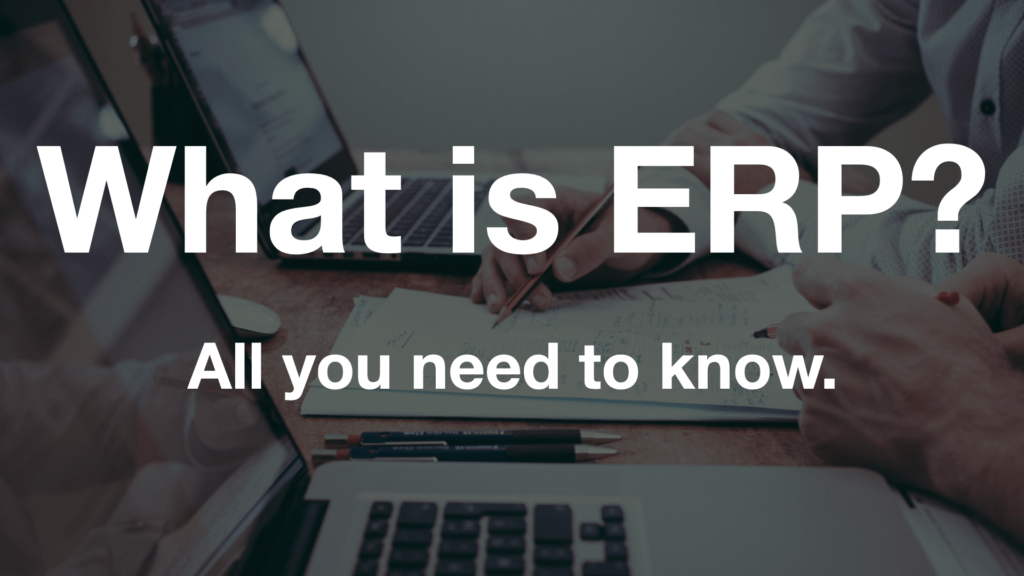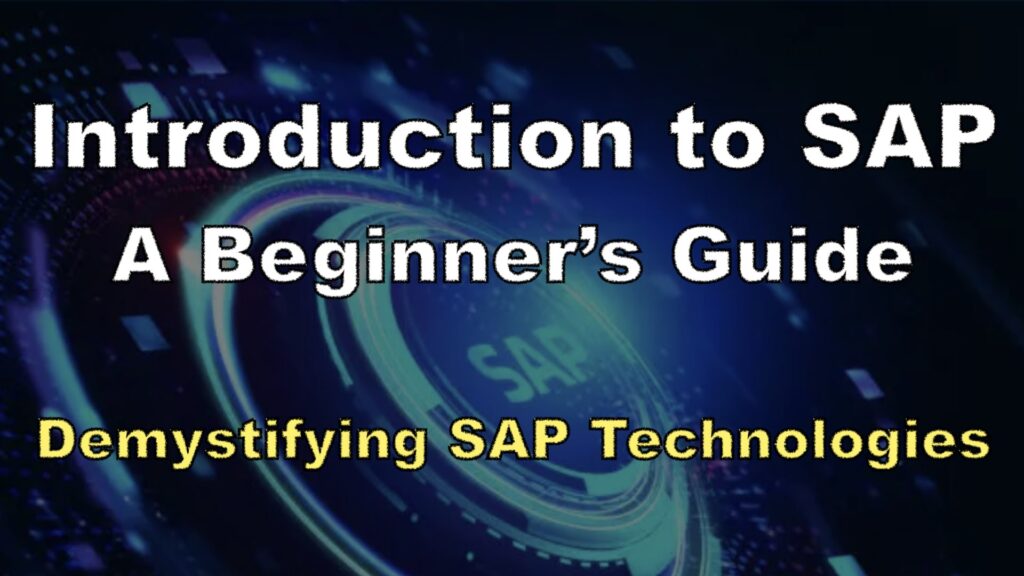What is SAP?
A Comprehensive Guide to SAP Evolution, Benefits, Integration, and Products
Introduction
SAP, also known as Systems, Applications, and Products, is a leading business software solution that helps organizations manage complex business operations efficiently and effectively. SAP applications enable businesses to control their operations in a structured manner and successfully achieve their goals. SAP technology has revolutionized the way businesses work, providing improved visibility, control, and streamlined workflows.
In this article, we will explore the evolution, history, and benefits of SAP. We will also discuss the integration of various SAP products, including SAP ERP, SAP CRM, SAP SRM, and SAP S4HANA.
Evolution and History of SAP
SAP has a rich history, dating back to the early 1970s, when five IBM engineers in Germany, led by Dietmar Hopp, formed a company called Systeme, Anwendungen und Produkte in der Dataverarbeitung (“Systems, Applications, and Products in Data Processing”). This company was established to help businesses manage their accounting and financial processes.
In the early days, SAP software was only available on mainframe computers and was very basic compared to the software available today. However, as the technology evolved, SAP began developing more sophisticated software, and in 1982, SAP released its first ERP solution, SAP R/2.
SAP R/3, the successor to SAP R/2, was released in 1992 and was the first ERP system that ran on client-server architecture. This was a significant improvement in terms of scalability, flexibility, and ease of use. The year 2004 saw the release of SAP ERP 2004, which integrated all processes of an enterprise and introduced innovative features like analytical reporting and workflow automation. Since then, SAP has introduced newer versions, like SAP ERP 6.0, SAP S/4HANA, and many more.
What is SAP software used for?
Traditional business models often distribute the responsibility of managing data across various functions, leading to separate databases and limited access to information for employees from different departments. Additionally, data duplication can result in higher IT storage costs and increased risks of errors.
SAP’s centralized data management approach offers multiple business functions an accurate and unified view of the data, enabling easy access to real-time insights across the enterprise. This simplifies complex business processes, increases operational efficiency, accelerates workflows, improves productivity, enhances customer experiences, and ultimately leads to higher profits.
What are the benefits of SAP?
SAP offers numerous benefits to organizations across industries. Here are a few key benefits:

Improved Operational Efficiency
With SAP, organizations can streamline their workflows, eliminate redundancies, and optimize their resources, enabling them to achieve high levels of operational efficiency.
Enhanced Visibility and Control
SAP provides real-time visibility into business operations, enabling organizations to make faster and informed decisions. Moreover, SAP has stringent security measures in place, which significantly reduces the risk of unauthorized access.
Better Business Intelligence
SAP provides advanced analytical and reporting capabilities that help organizations gain insights into their business operations. This enables them to identify potential growth areas, detect inefficiencies, and make informed decisions.
Improved business processes
SAP can streamline and automate business processes, resulting in greater efficiency and productivity.
Better data management
SAP offers robust data management capabilities, allowing companies to consolidate and analyze data from multiple sources.
Enhanced collaboration
SAP enables teams to work together more effectively and easily communicate across departments.
Lower costs
By automating processes and streamlining operations, SAP-system can help companies reduce costs and improve their bottom line.
Customizable
SAP is highly customizable, which allows companies to tailor the system to their unique needs and requirements.
Scalable
SAP is designed to scale with growing organizations, ensuring that it can accommodate their evolving needs.
Improved customer service
SAP can help companies deliver better customer service by providing a single, comprehensive view of each customer.
Regulatory compliance
Many SAP solutions have built-in compliance features, helping companies stay compliant with regulations and avoid penalties.
Easy to use
Despite its robust capabilities, SAP is designed to be user-friendly and intuitive, making it easy for employees to use and adopt.
What SAP solutions are available?
There are a lot of SAP solutions available that cater to different business needs. Here are some of the most popular solutions.

SAP ERP
SAP ERP is a leading business management software that allows organizations to automate their business processes across all functional areas, including finance, sales, logistics, and HR. It provides complete visibility into business processes and enables organizations to make informed decisions. Read more about ERP here >>
SAP CRM
SAP CRM is a customer relationship management solution that helps organizations manage their customer-related processes. It provides a complete view of the customer lifecycle and enables organizations to improve customer satisfaction.
SAP SRM
SAP SRM is a supplier relationship management solution that enables organizations to manage their procurement processes efficiently. It allows organizations to collaborate with their suppliers, automate procurement, and optimize supplier performance.
SAP S/4HANA
SAP S/4HANA is the next-generation ERP solution from SAP that offers enhanced functionalities like advanced analytics, real-time reporting, and machine learning. It provides improved decision-making capabilities and enables organizations to adapt to changing market conditions.
SAP Ariba
SAP Ariba is a cloud-based procurement solution that enables organizations to streamline their procurement processes, reduce costs, and improve supplier compliance. It provides complete visibility into the procurement process and enables collaboration with suppliers.
SAP HANA
SAP HANA is an in-memory database technology that enables organizations to process and analyze large volumes of data in real-time. It provides advanced analytics capabilities and enables organizations to make informed decisions based on real-time insights.
SAP SuccessFactors
SAP SuccessFactors is a cloud-based HR solution that enables organizations to manage their HR processes efficiently. It provides advanced HR analytics, social collaboration tools, and mobile access to HR data.
SAP Concur
SAP Concur is a cloud-based travel, expense, and invoice management solution that enables organizations to automate their travel and expense management processes, reduce costs, and improve compliance.
SAP Hybris
SAP Hybris is a multi-channel e-commerce platform that enables organizations to manage their e-commerce operations efficiently. It provides a complete view of the customer journey and enables organizations to deliver a personalized shopping experience.
SAP Fieldglass
SAP Fieldglass is a cloud-based vendor management system that enables organizations to manage their contingent workforce efficiently. It provides a complete view of the contingent workforce and enables organizations to improve vendor compliance.
SAP S4HANA & Deployment Option
SAP S/4HANA is the next-generation ERP solution from SAP that offers advanced features like improved analytics, real-time reporting, and machine learning. SAP S/4HANA provides a simplified data model, enabling faster reporting and higher analytics performance. It offers industry-specific solutions for various industries like retail, healthcare, oil and gas, and more, enabling them to manage their complex operations efficiently.
SAP S/4HANA comes in two deployment options: on-premise and cloud. On-premise deployment requires an organization to install and maintain the hardware and software needed to run SAP S/4HANA. Cloud deployment, on the other hand, allows organizations to access SAP S/4HANA from anywhere, at any time, as the software is hosted on the cloud. Cloud deployment also eliminates the need for hardware and software maintenance, enabling organizations to focus on their core business activities.
Summary
In this article, we explored the evolution, history, and benefits of SAP. We also discussed the integration of various SAP products, including SAP ERP, SAP CRM, SAP SRM, and SAP S/4HANA, with an emphasis on their future possibilities. SAP has come a long way since its inception, and its solutions have helped organizations across the world achieve their business objectives.
As SAP continues to evolve, it is poised to provide organizations with innovative solutions that can help transform their operations and drive growth. With the right SAP consulting partner, organizations can leverage SAP technology to streamline their operations and achieve success.
FAQ – Frequently Asked SAP Questions And Answers
Below are a few frequently asked questions and answers:
What is SAP?
SAP (Systems, Applications, and Products) is a leading business software solution designed to help organizations manage their complex business operations efficiently and effectively.
What is SAP ERP?
An SAP ERP system is a business management software that allows organizations to automate their business processes across all functional areas, including finance, sales, logistics, and HR. Read more about ERP here >>
What is SAP CRM?
An SAP CRM system is a customer relationship management solution that helps organizations manage their customer-related processes. It provides a complete view of the customer lifecycle and enables organizations to improve customer satisfaction.
What is SAP SRM?
An SAP SRM system is a supplier relationship management solution that enables organizations to manage their procurement processes efficiently. It allows organizations to collaborate with their suppliers, automate procurement, and optimize supplier performance.
What is SAP S/4HANA?
SAP S/4HANA is the next-generation ERP solution from SAP that offers enhanced functionalities like advanced analytics, real-time reporting, and machine learning. It provides improved decision-making capabilities and enables organizations to adapt to changing market conditions.
What is SAP Ariba?
SAP Ariba is a cloud-based procurement solution that enables organizations to streamline their procurement processes, reduce costs, and improve supplier compliance. It provides complete visibility into the procurement process and enables collaboration with suppliers.
What is SAP HANA?
SAP HANA is an in-memory database technology that enables organizations to process and analyze large volumes of data in real-time. It provides advanced analytics capabilities and enables organizations to make informed decisions based on real-time insights.
What is SAP Rise?
SAP Rise is an all-in-one package from SAP that includes their cloud technology, industry expertise, and digital tools to help businesses transform and streamline their operations. In short, it’s a comprehensive solution to help businesses improve efficiency and stay competitive in their industry.
What is SAP SuccessFactors?
SAP SuccessFactors is a cloud-based HR solution that enables organizations to manage their HR processes efficiently. It provides advanced HR analytics, social collaboration tools, and mobile access to HR data.
What is SAP Concur?
SAP Concur is a cloud-based travel, expense, and invoice management solution that enables organizations to automate their travel and expense management processes, reduce costs, and improve compliance.
What is SAP Hybris?
SAP Hybris is a multi-channel ecommerce platform that enables organizations to manage their ecommerce operations efficiently. It provides a complete view of the customer journey and enables organizations to deliver a personalized shopping experience.
What is SAP Fieldglass?
SAP Fieldglass is a cloud-based vendor management system that enables organizations to manage their contingent workforce efficiently. It provides a complete view of the contingent workforce and enables organizations to improve vendor compliance.
What are the benefits of using SAP?
The benefits of using SAP include improved operational efficiency, enhanced visibility and control, better business intelligence, and improved decision-making capabilities.
What types of products does SAP offer?
SAP offers a wide range of products, including ERP (Enterprise Resource Planning), CRM (Customer Relationship Management), SRM (Supplier Relationship Management), S/4HANA, Ariba, HANA, SuccessFactors, Concur, Hybris, and Fieldglass.
What is SAP Cloud Platform?
SAP Cloud Platform was an open platform-as-a-service (PaaS) that enables organizations to build, extend, and integrate their business applications in a secure cloud environment provided by SAP. SAP Cloud Platform has been rebranded as SAP Business Technology Platform (BTP).
What is SAP BTP?
SAP Business Technology Platform (SAP BTP) is an all-inclusive cloud-based platform that helps businesses manage and develop their applications and services. It enables businesses to build, integrate, and extend their solutions using various technologies like AI, analytics, and more. Essentially, SAP BTP serves as a one-stop-shop for businesses that need a robust and flexible platform for developing their digital solutions.
What is SAP Fiori?
SAP Fiori is a collection of apps that enables organizations to access and use their SAP software on mobile devices and desktops in a way that is more intuitive and user-friendly.
What is SAP Fiori App Reference Library?
SAP Fiori Apps Reference Library is a library of apps developed by SAP that enhance the user experience of SAP software. The library is constantly growing and being updated with new apps, so users can always find the right app to help them work more efficiently.
What is SAP Lumira?
SAP Lumira is a data visualization tool that helps organizations create interactive dashboards, reports, and graphs.
What is SAP Analytics Cloud?
SAP Analytics Cloud is an all-in-one cloud-based analytics platform that enables organizations to analyze data in real-time and make informed business decisions.
How do I get started with SAP?
To get started with SAP, you need to choose a product that is relevant to your business needs and requirements. You can then contact an SAP consulting partner to help you implement and customize the software to suit your needs.
How long does it take to implement SAP?
The time it takes to implement SAP varies depending on the complexity of the project. A basic implementation may take a few weeks, while a more complex implementation can take several months or even years.
What is the cost of implementing SAP?
The cost of implementing SAP depends on the product, the size of the organization, and the complexity of the project. It is important to work with a trusted SAP consulting partner to develop a realistic budget.
Is SAP a cloud-based solution?
SAP offers both on-premise and cloud-based solutions, providing organizations with flexibility and choice.
Can SAP be integrated with other software systems?
Yes, SAP can be integrated with other software systems to provide a complete view of business operations.
Can SAP be used by small businesses?
Yes, SAP offers solutions that are designed specifically for small and medium-sized businesses.
Is SAP user-friendly?
SAP software can be customized to suit the needs of the organization, making it easy for users to navigate and access the information they need.
Can SAP help improve business processes?
Yes, SAP can help organizations optimize their business processes, eliminate redundancies, and improve efficiency.
Is SAP suitable for all industries?
SAP offers industry-specific solutions for various industries like retail, healthcare, oil and gas, and more, enabling them to manage their complex operations efficiently.
Know more about the Blog and the Author.
Related search terms:




Pingback: Introduction to SAP: A Beginner's Guide